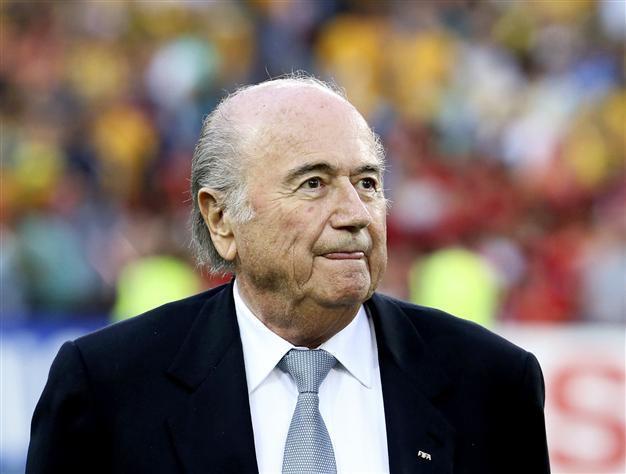Alleged AFC cover-up effort highlights problems in Asian football
James M. Dorsey Hürriyet Daily News

FIFA President Sepp Blatter. REUTERS Photo
A senior executive of the Asian Football Confederation (AFC) allegedly requested in 2012 a subordinate to tamper with or hide documents related to inquiries by independent auditors and FIFA into management of the group by ousted AFC President Mohammed Bin Hammam, according to claims.
The official who reportedly requested the tampering or hiding of documents bearing his name or signature, AFC General-Secretary Dato’ Alex Soosay, subsequently alleged in a police report on Aug 17, 2012, that Bin Hammam embezzled some $10 million, the Malaysian Commercial Crime Investigation Department (JSJK) told the Malay Mail. The police handed the case over to the Malaysian attorney general who decided not to take further action.
Soosay this week vehemently denied the alleged cover up in a telephone conversation with the Malay Mail as he was boarding a flight from Dubai to Bahrain. “If there was something, wouldn’t they have investigated me? This is just a smear [campaign] against me. There is no such thing,” Soosay said. “Where is this coming from and why now?”
In a written and signed statement dated July 26, 2012 and a video statement taped the same day by Michael John Pride, a FIFA security officer, AFC Finance Director Bryan Kuan Wee Hoong claimed that Soosay made his request during a 30-minute conversation that took place three days earlier on July 23 to which he had been summoned by the general secretary.
In a letter to Soosay dated Sept. 27, 2012, Bin Hammam’s lawyer, Eugene Gulland of law firm Covington & Burling LLP, asserted that the general secretary had a conflict of interest as a result of a PriceWaterhouseCoooper investigation into the matter and demanded that he excuse himself from any involvement in the investigation of Bin Hammam.
Gulland asserted further that Soosay had been intimately involved in the negotiation of the WSG contract as well as a broadcast agreement with Al-Jazeera. “It appears that you failed to reveal [to PwC] the existence of the Ad Hoc Committees which negotiated these contracts [on which you sat] nor the numerous internal review meetings both before and after the conclusion of the contracts in which you were involved…. In these circumstances it should be abundantly clear that you were completely conflicted with respect to the matters presently under investigation,” Gulland wrote.
“All of this was related. It was a complicated period. Only a small circle within the AFC knew about it. The documents were all connected to investigations we were doing,” said one of the sources.
The leaking of Kuan’s statements came as AFC president Sheikh Salman Bin Ebrahim al-Khalifa stands to be re-elected at an AFC congress on April 30 in his home country of Bahrain. Sheikh Salman, who is the only candidate in the election and will automatically also become FIFA vice president, was initially elected in 2013 to succeed Bin Hammam and introduce reforms that would ensure proper governance of the AFC.
Instead, Sheikh Salman since taking office buried a PwC audit into the matter and moved to centralize power within the group in his hand. In doing so, Sheikh Salman reneged on promises to establish a committee to look into political interference in Asian football and to report within a month on the status of the PwC audit. The burying of the audit effectively precluded an investigation of Soosay after he was identified in the audit as having been one of three AFC executives who had authorized payments related to Bin Hammam that were being called into question by PwC.
“The audit’s purpose was to deal with Bin Hammam. It served its purpose. It’s been buried,” said an AFC executive committee member, suggesting that establishing facts as the basis for reform had not been the group’s primary purpose in commissioning the audit.
Sheikh Salman last year persuaded the AFC to adopt a resolution that solidified his power base by automatically nominating the group’s president as FIFA vice president. The move meant that the Asian FIFA vice presidency would no longer be an elected position.
As a result, Prince Ali Bin Al-Hussein of Jordan, who had been elected as FIFA vice president, would no longer be able to run for that office. A leading reformer in world football, Prince Ali is challenging FIFA President Sepp Blatter in the world football body’s presidential election scheduled to be held next month.
In an open letter last year to the Asian football community, Prince Ali charged that Sheikh Salman and “other AFC officials” were “driven purely by politics,” Prince Ali said it was “unfortunate” that the AFC was not focusing its “energies and valuable time to improving the game in Asia and addressing the myriad challenges that AFC faces in marketing, grassroots football, women’s football, transparency and accountability.”
The PwC audit concluded that Bin Hamman had used an AFC sundry account as his personal account. It also questioned a $1 billion master rights agreement with Singapore-based World Sports Group, which was negotiated by Mr. Bin Hammam.
The audit advised the AFC to seek legal counsel to ascertain whether the contract could be canceled or renegotiated. It also suggested that the AFC solicit legal advice on potential civil or criminal charges against Bin Hammam. The PwC report constituted the basis for FIFA’s decision in late 2012 to ban the Qatari for life from involvement in professional football.
